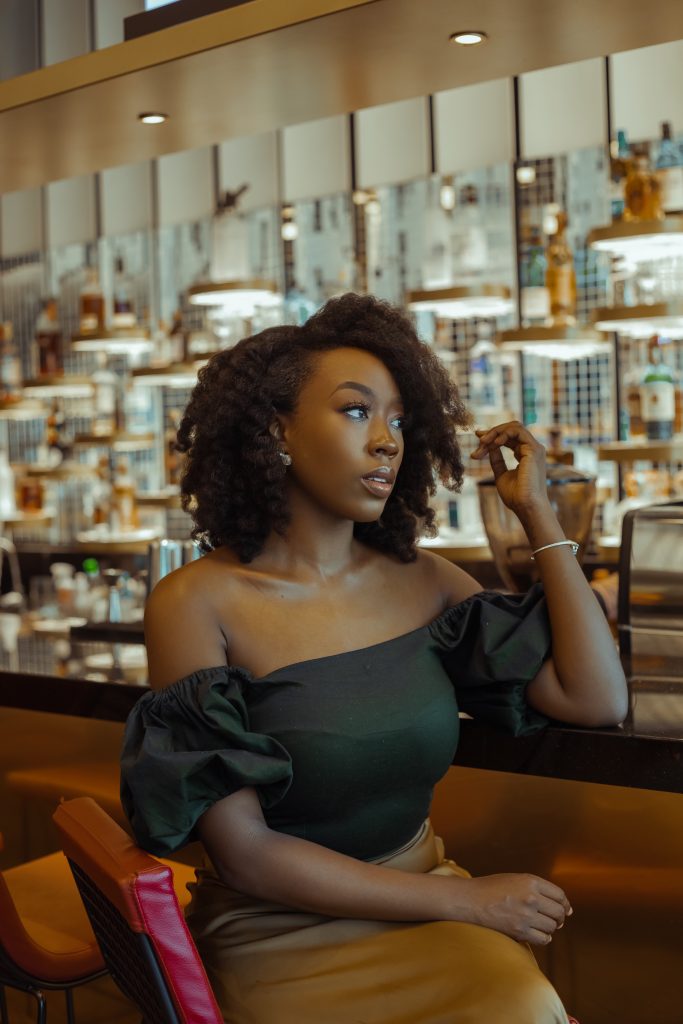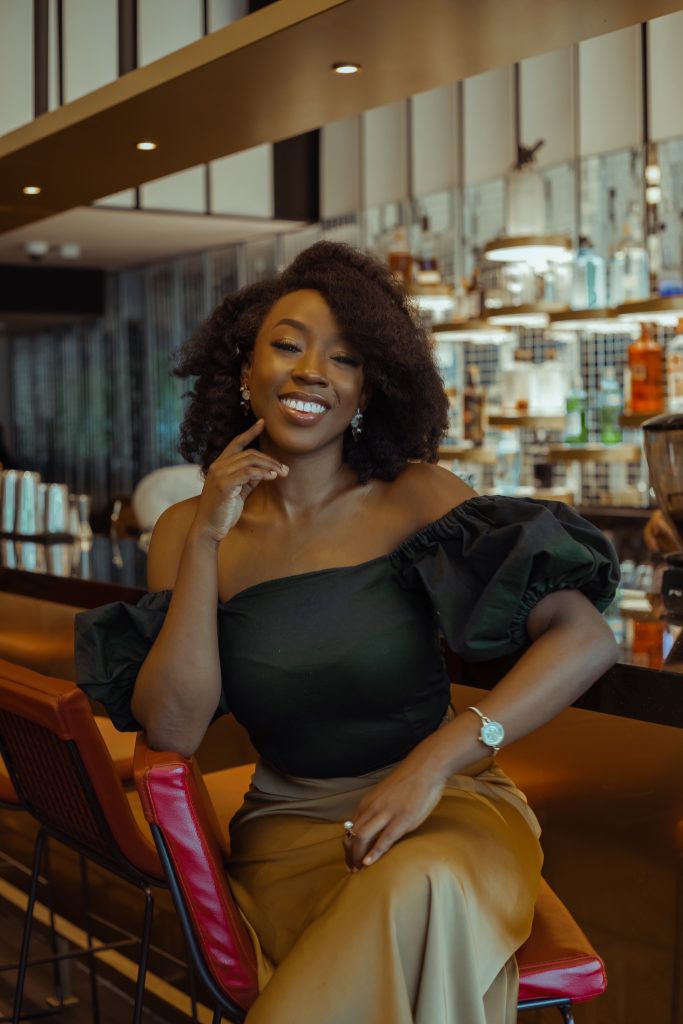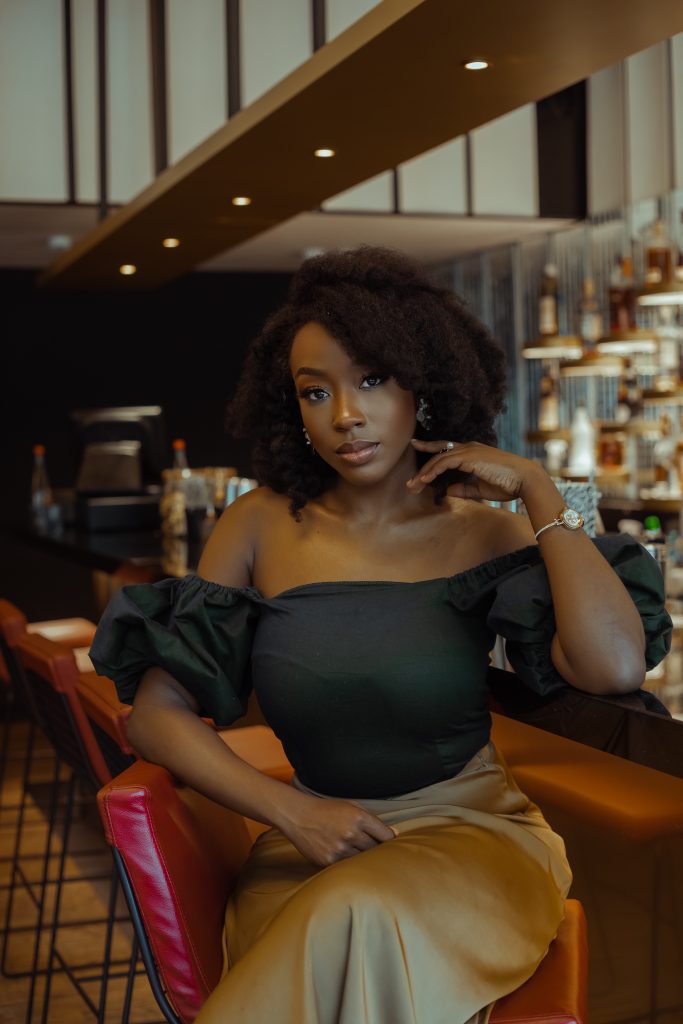The Beverly Naya Influence
The Two Weeks In Lagos Star On Colorism, Nigeria and Loving Oneself

When Beverly Naya started acting at 17, she had no idea she would be the powerhouse that she is now. “I’ve always been very ambitious and a go-getter so I definitely knew I would be successful but I don’t think I realised just how successful I would be,” she says. We had been in communication for about a month before doing this interview via Zoom and if there’s one thing I’ve learnt, it is that Beverly Naya knows exactly what she wants and she is not afraid to go after it. This is probably one of the reasons why she’s one of Nollywood biggest successes. From roles in Nollywood’s biggest films to producing an award-winning documentary that inspired thousands all over the world, Beverly is taking the film world by storm and she has no plans of stopping any time soon. For RADR AFRICA’s January cover story, I sat down (figuratively) with Beverly Naya to talk about Nigeria, Skin, and what it was like on the set of The Wedding Party.
You started acting when you were 17, Looking back now, did you think you would be as successful as you are now?
I’ve always been very ambitious and a go-getter so definitely knew I would be successful but I don’t think I realised just how successful I would be. And I don’t even think I’ve peaked yet, there are still a lot of things I want to do.
Let’s talk about one of your most acclaimed work. When Skin was released in 2019, It was the first documentary exploring colorism in Nigeria, what inspired you to produce a documentary on this topic?
I always knew I wanted to do a documentary on bullying because I was bullied a lot growing up. When I was in Nigeria, I realised how big of a problem colorism is and started doing a lot of research on it. Colorism is actually really prominent in our society and a lot of people don’t know it. So in 2014, I started working on it and talking about it with people and here we are.Skin was very well received with a lot of people seeing themselves in it.
How do you feel about all the good reception it has received?
I am really grateful for the positive reception Skin received especially after it was on Netflix. I think I really underestimated the reach of Netflix. It was on other platforms in 2019 but the minute it got on Netflix last year, I started receiving messages from all over the world. People in Brazil, America, South America were sending encouraging messages. I was getting messages in Portuguese and I couldn’t even read what they were saying but it was just really inspiring. The fact that the documentary was able to inspire people on such a global level was a dream come true because I knew that I wanted the message to go outside the shores of Nigeria and become a global message and it was doing just that.
Have you personally had any experience with colorism?
For me, colorism hasn’t been overt. It is more experiences that you think about later and think to yourself, wait, did I just experience colourism? The sad thing is most people don’t see their words as offensive, to them, it’s just their opinions but it’s way deeper than that.
Do you have any plans to produce more documentaries?
I hope to do a couple of documentaries. I have been asked and outside of that I have some documentaries that I would like to shoot. But first before I do that, I want to do my first feature, that’s what my team and I are working on now, we’re already in preproduction and we plan on shooting before the end of the year.
You mentioned on Twitter that you hate how the media stereotypes women. Do you want to expand on that?
I think the media, especially in Nigeria, places too much emphasis on marriage. I could do an interview on my work and career and the headline would have something to do with marriage or men. There are so many layers to being a woman and all they focus on is a woman’s marital status. And it is only ever women that are subjected to this, the media needs to stop seeing women as beings who exist solely for men, we are way more layered than that.

Let’s talk about Nigeria, I saw some of your pictures and content during the End SARS Protests. Why was it important for you to show up for that?
I don’t think that should even be a question, this is the country that I live in, why would I not want to show up and be a part of a movement that could potentially affect not just my future but also generations to come. If we don’t see change, we need to go out there and fight for it. If we don’t fight for change and expect more from our government, at what point will anything change in Nigeria? So I felt like it was very important to be a part of that movement and to lend my voice and help in ways I could. Also it was like, you have this influence for a reason, what are you doing with it, what kind of change are you effecting with your influence. I think it is really important to ask yourself these kind of questions especially when you have some kind of influence in any society.
How do you think the government should have responded?
Listen to the people. Show us that you have actually heard what we’re saying and you’re willing to effect change. Also let us know what happened on 20/10/20. It would be great to know what exactly happened on that day and why it happened. Most importantly, we need it to be safer in the country. Security needs to be better, we need to feel like the police are actually our friends and not just people who are there to intimidate us when we don’t give them money. The system needs to change and we know that that change will not come unless our government listens to us. So the government needs to listen to us, realise that we do have a voice and are not just people they can brush aside. That’s what democracy is all about.
You have a movie coming out soon titled 2 Weeks In Lagos. What made you decide to take on the character of Lola?
I loved Lola’s calm and collected nature, she exudes positive energy and I really liked that about the character whilst reading the script. I also appreciated her journey with God and her willingness to put him first at all times, I feel Lola is a character that would resonate well with a lot of people and inspire people to want to strengthen their relationship with God.

2 weeks In Lagos is a love story with underlying themes of arranged marriage and politics. Why was it important to you to be in a movie that talks about these things?
It’s a societal problem and I think it’s important to always bring these issues to the forefront through art and other channels. By speaking about them we are able to hopefully effect positive change, I believe that’s what 2 Weeks In Lagos hopes to accomplish as well.
The movie is set in Lagos and is partly about the complexities of the city. How do you feel about Lagos?
Lagos is a city that you either love or you hate, it’s chaotic but it’s fun all at the same time. I love the hustle and bustle of Lagos and the resilient nature of the average Lagosian. The traffic has got to go though! Oh! And of course, all the Yoruba demons haha! We need more guys like Ejikeme from 2 Weeks In Lagos haha.
You are a British-born Nigerian. Do you ever feel not British enough for Britain and not Nigerian enough for Nigeria?
I think in the early years, when I first came to Nigeria, I did feel like I wasn’t Nigerian enough. I was trying to be more Nigerian and in the process of doing that, I lost myself. By the time I went back to England, I didn’t even feel British enough anymore. I guess I was having an identity crisis and it was a depressing time for me but now, I just embrace who I am. I’m not changing who I am to please anyone or dumbing myself down or changing myself just to be accepted. I am who I am and if you accept me, great. If you don’t, that’s really none of my business. That’s the mentality I have now and with that comes a lot of peace because you’re not trying to please, you’re just living and enjoying the life that God has given you. So I embrace both of my cultures in all areas of my life.
What is your favorite show or movie that you’ve ever been a part of and why?
I’m not sure, to be honest. I’ve been in some pretty cool movies and I’m not too sure. I think The Wedding Party was fun. It was a one-of-its-kind never-been-done-before film. The script was absolutely hilarious and translated well because the film was just as funny, maybe even funnier. So yeah, I would say The Wedding Party because it was just a fun experience shooting that film and watching it come to life was quite rewarding.
Lastly, If you could say anything to your younger self, what would it be?
I would say be patient with yourself. Don’t rush the process, trust and believe that you are on the right path and don’t rush to grow up. Enjoy every single moment it’ll be worth it in the end. I think I’ll want to let her know that she’s enough and that she’s worthy, she’s amazing and she just has to work on finding her confidence.